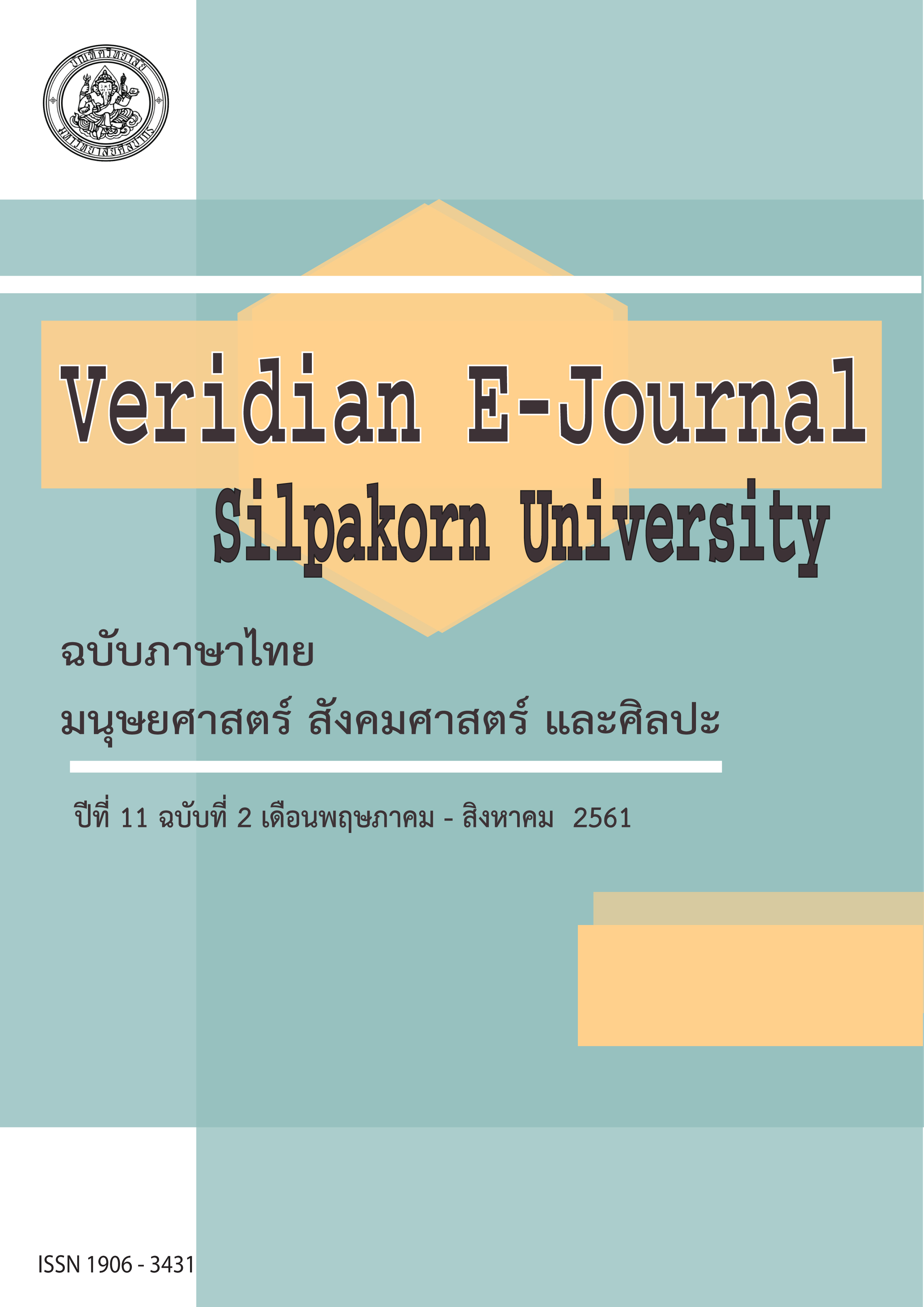การพัฒนาบทเรียนภาษาอังกฤษเพื่อการท่องเที่ยวระยะสั้นโดยใช้สถานการณ์จำลอง เพื่อพัฒนาความสามารถด้านการพูดภาษาอังกฤษสำหรับนิสิตระดับปริญญาตรี (English for Tourism Short Course Development Using Simulation Approach to Enhance Speaking Abilities for -) English for Tourism Short Course Development Using Simulation Approach to Enhance Speaking Abilities for Undergraduate Students
Main Article Content
Abstract
วัตถุประสงค์ของการวิจัยนี้เพื่อ 1) พัฒนาบทเรียนภาษาอังกฤษเพื่อท่องเที่ยวระยะสั้นโดยใช้สถานการณ์จำลองเพื่อพัฒนาความสามารถด้านการพูดภาษาอังกฤษสำหรับนิสิตระดับปริญญาตรี 2) เพื่อเปรียบเทียบความสามารถด้านการพูดภาษาอังกฤษเพื่อท่องเที่ยวหลังการเรียนโดยใช้สถานการณ์จำลองกับเกณฑ์ร้อยละ 80 และ 3) ศึกษาความคิดเห็นของกลุ่มตัวอย่างหลังการเรียนโดยใช้สถานการณ์จำลอง กลุ่มตัวอย่างได้มาโดยการเลือกแบบเจาะจง (Purposive sampling) จากนิสิตระดับปริญญาตรี ชั้นปีที่ 2 - 4 คณะศึกษาศาสตร์และพัฒนศาสตร์ จำนวน 38 คน ที่อาสาสมัครเข้าร่วมโครงการ เครื่องมือที่ใช้ในการวิจัย ได้แก่ แผนการสอน สถานการณ์จำลอง แบบประเมินความสามารถด้านการพูดภาษาอังกฤษ แบบสอบถามความพึงพอใจและแบบสะท้อนความคิดเห็น สถิติที่ใช้ในการวิเคราะห์ผลได้แก่ ค่าร้อยละ ค่าเฉลี่ย และ One sample t-test แบบสะท้อนความคิดเห็นวิเคราะห์ผลโดยใช้การวิเคราะห์แก่นสาระ
ผลการวิจัยพบว่า
1) บทเรียนมีค่าดัชนีสอดคล้องของความตรงเชิงเนื้อหา (IOC) อยู่ระหว่าง 0.67-1.00
2) นิสิตมีความสามารถด้านการพูดภาษาอังกฤษเพื่อการท่องเที่ยวหลังเรียนสูงกว่าเกณฑ์ ร้อยละ 80 อย่างมีนัยสำคัญทางสถิติที่ระดับ .05
3) นิสิตมีความพึงพอใจในภาพรวมอยู่ในระดับมาก ( x = 4.11, SD = 0.82) หรือนิสิตร้อยละ 82.13 มีความพึงพอใจในภาพรวมอยู่ในระดับมาก
4) นิสิตมีความคิดเห็นโดยรวมว่าการเรียนการสอนโดยใช้กิจกรรมสถานการณ์จำลองทำให้นิสิตมีโอกาสฝึกพูด มีความกล้าใช้ภาษาอังกฤษเพิ่มขึ้น และสามารถนำความรู้ไปใช้ในสถานการณ์จริงได้
This research aimed to: 1) develop a short course of English for Tourism using simulation approach to enhance speaking abilities for undergraduate students, 2) compare the speaking ability after learning with simulation approach to the criterion 80 percent threshold, and 3) study the perceptions of the students towards the learning activities. The study samples from Purposive Sampling were 38 students studying in Year 2 – Year 4 the first semester for Academic Year 2016 at the Faculty of Education and Developmental Sciences, Kasetsart University, Kamphaengsane Campus who volunteered to participate in the project. The research instruments included lesson plans, simulation, speaking evaluation form, and a reflection journal. Data analysis was based on statistics such as percentage, mean and One sample t-test. The reflection journals were analysed using thematic analysis.
The results showed that:
1) IOC value for content validity of the lesson was between 0.67-1.00;
2) after learning with simulation approach students’ speaking abilities were higher when compared to the criterion 80 percent threshold which matched the level of statistical significance .05;
3) the average satisfaction of the students on the learning experience with simulation was at a high level ( = 4.11, SD = 0.82) or 82.13 percent of students was highly satisfied with the program; and
4) students believed that simulation activities provided opportunities to practice speaking as well as encouraged them to speak more and further applied the knowledge to the real-life situations.

